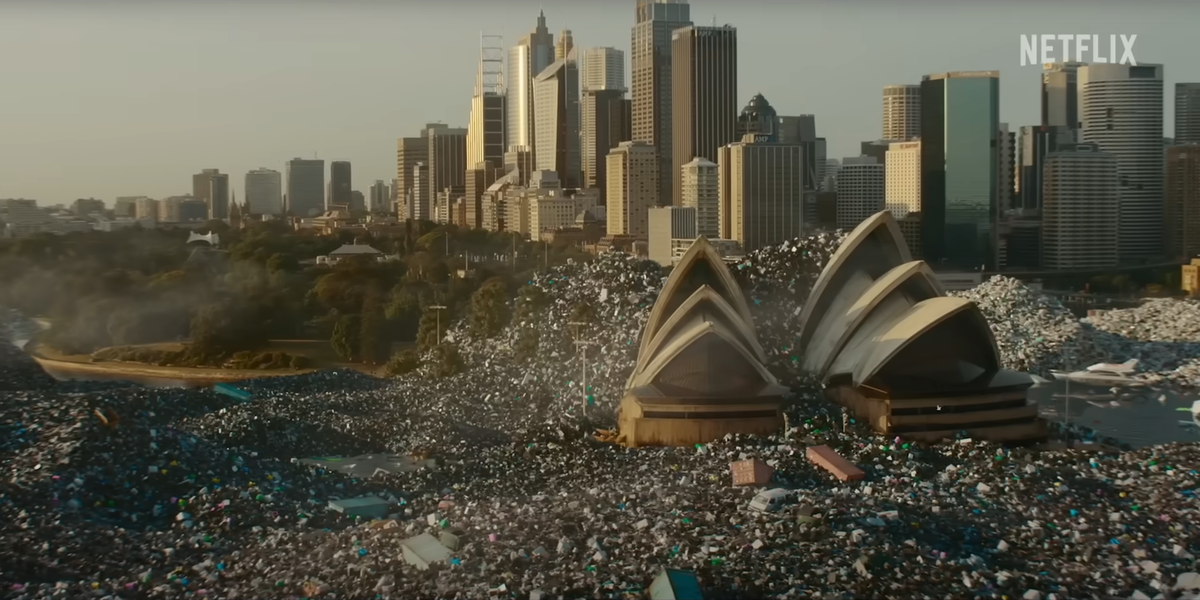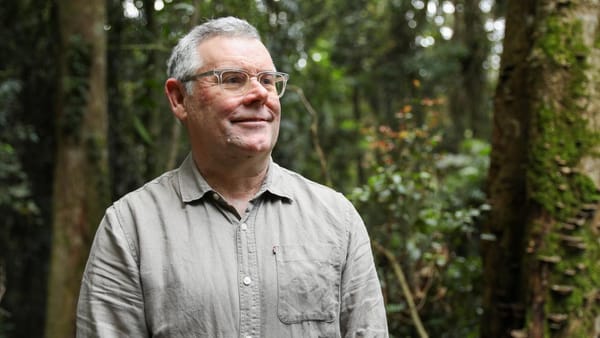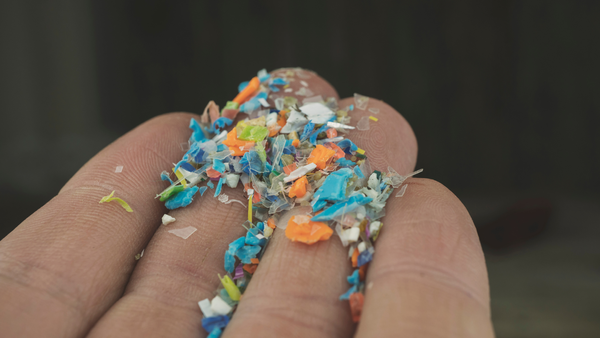The Hypocrisy of Sustainable Packaging
'Eco-friendly' products aren't friendly enough to (brown) paper over our consumption crisis, but could a Netflix documentary kick off a reckoning with the dark side of our comfort and convenience culture?

Once you see the impact our convenience and comfort culture is having on this planet, you can't unsee it.
Our Materials Blindness shields it from view for the most part. But we all know that we can't go on living like this. It gnaws away at your subconscious and bubbles to the surface whenever you see a wrapped banana at the supermarket, have to dispose of the excess packaging from an online purchase, or (heaven forbid) see a video of a far-flung coastline choked by plastic detritus on your social feeds.
The realisation gnawed at me even as I wrote last week's Biomimicry Post. Replacing plastic with sustainable alternatives like seaweed-based packaging or bio-assimilating fibres can be a radical improvement (with the appropriate end-of-life pathways), but if we're still buying, using, and discarding with reckless abandon—the way brands, business, culture, and the economy demand we do—we're still going to overshoot our planetary boundaries.

As we continue to wrap ourselves in convenient comforts, "sustainable packaging" has become the feel-good solution plastered across shelves, ads, and social feeds. From compostable coffee cups to recycled plastic water bottles, brands are selling us the dream of "eco-friendly" consumption, leaving us assured that we're doing our bit for the planet.
But scratch beneath the uncoated and recycled exterior of green marketing, and a much darker truth emerges: our culture of convenience and consumption isn't going away; it's simply being rebranded as "sustainable".
The shapeshifting abilities of capitalism to absorb and adapt is astonishing. It has taken this rejection, reframed it, repackaged it, and is now selling it back to us.
I was contemplating this question in the shower when I noticed a bottle of environmentally friendly shampoo. It was the same brand I saw at an eco-conscious gathering I attended recently. Apparently, countercultural people buy this shampoo like this. As the water swirled around my feet, I felt doubly naked. Capitalism will happily take your rejection and sell it back to you. Don't like extractive consumerism? No worries! We have a shampoo just for you." Alexander Beiner (bold emphasis is mine).
"Eco-Friendly" Isn't Friendly Enough
The rise of eco-friendly packaging, such as compostable wrappers and recycled plastic bottles, is a small step forward, but it doesn't solve the core issue—our relentless appetite for more.
Bill Reed (one of the originators of Regenerative Design) once said:
"We're never doing something that is zero damage. So if that's the case, we are still degenerating the planet, and sustainability is just a slower way to die."
Once again, the bold emphasis is mine.
Through Bill's regenerative lens, our nascent focus on greener packaging is beginning to feel more like symptom management than a cure.
As I mentioned last week:
For a closed-loop system (such as our planet) to remain in balance, all waste must be a food source for something else and metabolised without accumulation or resource depletion. Ecosystems fall out of balance when the waste being created grows exponentially or the ability to process that waste is diminished.
We're in considerable overshoot on both fronts.
There's no getting around the fact that we need to start reducing consumption and rethinking the design of our lives to move beyond the need for single-use, regardless of its material.
I just don't think we're able to reckon with that message... yet.

Imagine if a bath was overflowing in your house and everyone was frantically running around trying to grab every towel, blanket, bucket, and bowl in the house to try and stanch the overflow. Unable to reach the tap yourself through the chaos, you shout, exasperated to, "Turn the bloody tap off!".
That's what this feels like.
Shouting into the void.
Buy Now! The Shopping Conspiracy
That was until this Netflix trailer dropped last week:
It will be interesting to see if this Netflix documentary lives up to its promise and, better still, gains The Social Dilemma levels of traction to blow up this not so little, yet very dirty secret about our comfort and convenience culture.
I hope it's a catalyst for waking up the entire business value chain—from ad agencies to manufacturers—to how our collective materials blindness and comfort-driven culture are destroying our ecosystems and making us sick.
I'm also hoping it will be a conversation starter between industry, brands, retailers and government about the need for Extended Producer Responsibility (EPR) regulations with real teeth. Regulations that ensure the fees collected are being funnelled into the certification, collection, recycling, and composting infrastructure we need to fix this mess.
As the Adidas whistleblower says in the trailer:
"Every industry needs to stop putting it on the consumer. Stop making it our responsibility. It's yours."
After all, supply drives demand, not the other way around.
Netflix's timing is impeccable, with the release landing a week before the Black Friday sales and just in time for the fifth session of the global plastics treaty negotiations (INC-5) in Busan.
The headwinds from the petrostates and the plastic industry are strong, with fossil fuel lobbyists outnumbering national delegations, scientists, and Indigenous peoples at the previous INC-4 negotiations and industry pushback on the inflationary nature of EPR-based fees.

We can't miss this opportunity to change course and kick yet another critical environmental issue down the road for future generations to deal with.
Our last best chance for systems change
If we are serious about reducing environmental impact, we need to pivot from merely producing greener products to fundamentally rethinking the volume of products we consume.
Brands can lead this charge by promoting products that last longer, offering refillable and repair options, and designing with minimalism in mind.
Like my toaster:

These aren't radical ideas; if anything, they're conservative, logical steps toward a s̶u̶s̶t̶a̶i̶n̶a̶b̶l̶e̶ regenerative future.
Packaging waste is not a simple problem. We can't solve it by switching from plastic to paper or from disposable to compostable. We have to change the consumption patterns that feed our unsustainable system.
And for that, we need a shift in mindset—an honest look at our comfort-driven culture and a willingness to redefine convenience. Then we need systems change. Rather than placing the responsibility on consumers, the change needs to start within the industry itself, backed by regulations that hold companies accountable.
In a world obsessed with more, maybe the most radical act is to embrace less.
We simply must stop consuming and discarding so much stuff. But don't mistake the simple for the easy. This will be hard. Real change always is. For a start, the reason why this narrative isn't gaining traction is that it threatens the gospel that economic growth is a universal, secular good for society.

Slowing that down (even if it is to save the ecology that underpins our existence) won't be popular among corporates, business owners, and shareholders used to profits driven by overconsumption. The old adage of it being easier to imagine the end of the world than the end of capitalism is a testament to our lack of curiosity, creativity and accountability in tackling these problems head-on.
Tyson Yunkaporta, in a podcast I listened to many years ago, lays much of the blame for this mindset on our monotheistic hero myth, which has us viewing humanity as the species that separated itself from nature, conquered it and sits on top of the food chain. When really, we are its custodial species. He finds even the idea that we need to save nature as absurd, given that we are nature itself and rely on it to survive and thrive. We are nature's stewards, and we've been making a terrible mess of it.
The best time to turn this around would have been decades, even centuries ago.
The next best time is now.
So, let's get to it.
In the meantime, make sure you jump on to Netflix this weekend to watch 𝗕𝘂𝘆 𝗡𝗼𝘄! 𝗧𝗵𝗲 𝗦𝗵𝗼𝗽𝗽𝗶𝗻𝗴 𝗖𝗼𝗻𝘀𝗽𝗶𝗿𝗮𝗰𝘆 and do your bit to get it into the global Top 10 and hopefully kick off a reckoning with this dirty, not so little secret.





